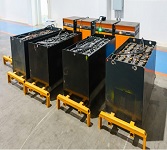Battery Materials to Become Greener with Advent of Sustainable Energy Revolution
 In today’s era, energy storage plays a crucial role in our life and battery material is at the core when it comes to fulfilling energy storage demand.
In today’s era, energy storage plays a crucial role in our life and battery material is at the core when it comes to fulfilling energy storage demand.
The battery materials market has been growing at a rapid pace over the last few years. The increase in the usage of lead-acid and lithium-ion (Li-ion) batteries and surge in demand from the consumer electronics and automotive industries are some of the major driving factors of the global battery material market. According to Allied Market Research, the global battery material market is expected to reach $80.5 billion by 2030, registering a CAGR of 5.9% from 2021 to 2030.
Major announcements and collaborations in the battery material market:
The key players in the battery material industry have been focusing on expanding their business by developing innovative products that could increase overall efficiency. For instance, Umicore, a leading material technology company announced its investment in Solid Power, a major producer of all-solid-state rechargeable batteries for electric vehicles. This investment is expected to develop a low-cost battery and increase the energy density from 50% to 70% as compared to commercially available Li-ion batteries. Moreover, it is lighter and has faster charging times than available alternatives which give an advantage to the automobile sector.
Apart from the innovations, several companies have indulged in collaborations to expand their market presence. For instance, Polarium, a provider of energy Storage Company partnered with Northvolt, a European supplier of sustainable, high-quality battery cells and systems. The collaboration would help the companies to deliver green battery cells to the telecom industry. Furthermore, according to the CEO of Polarium, this collaboration will aid in lowering the carbon footprint as the company would manufacture the battery products from the fossil-free production facility with the highest recycling standards. This is expected to help the company to maintain a pollution-free environment.
Similarly, Volvo Car Group, the most well-known car brand announced its joint venture with Northvolt, a leading Swedish battery company. The business deal would enable companies to build sustainable and cutting-edge battery cells for Volvo and Polestar vehicles. Moreover, the companies have proposed to open a new R&D center in Europe to develop revolutionary batteries and provide an efficient and cost-effective supply chain of high-quality and sustainable batteries in Europe.
Trends that will drive the demand in the future:
With the rise in innovations in the automotive sector, the demand for electric vehicles around the world is bound to rise, which in turn, increases the need for battery materials. Furthermore, technological advancements in the electronics sector have increased innovations in battery materials. On the other hand, the development of solid-state electrolytes and the introduction of sodium-ion batteries would have a direct impact on the growth of the battery materials market in the future.
The recent initiation of the Indian government, Faster Adoption, and Manufacturing of (Hybrid &) Electric Vehicles (FAME) has augmented the growth of the battery material market in the Asia-Pacific. What’s more, battery materials have witnessed increased demand in emerging countries due to a surge in industrial applications such as the telecommunication sector, medical equipment, and oil drilling.
To meet end-user demand in the future, market leaders must invest a substantial amount and time in their research. Moreover, the demand for battery materials that offer higher storage capacity at inexpensive costs would increase in the coming years. In addition, the emphasis on creating solutions for recyclable battery packs that can be fixed and resealed without triggering a surface breakdown would increase as concerns about sustainability and the need for cost-effective alternatives grow.
References:
Comments (0)
This post does not have any comments. Be the first to leave a comment below.
